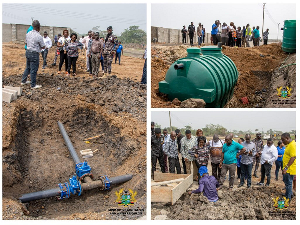Agenda for Change Conference ends in Accra

A two-day national forum on water and sanitation issues concluded over the weekend in Accra.
Themed “At The Crossroads: Climate Change, Population, and Africa’s Development,” the conference featured speakers from around the world in plenary sessions, parallel sessions, round-tables, and expert dialogues, among others.
The forum aimed to produce recommendations on how best to address the negative impacts of behavioral change and rapid population growth on sustainable development in water and sanitation.
Naa Prof. John Nabila, President of the National House of Chiefs and Chairman for the occasion, emphasized the real effects of climate change on human populations, noting that these challenges are widespread at global, continental, and national levels.
He observed that negative impacts such as droughts, and floods in both rural and urban areas, and their effects on fisheries, forestry, and tourism are major obstacles to development efforts, particularly in Africa.
Prof. Nabila urged policymakers and stakeholders to intensify efforts to mitigate the adverse effects of climate change.
“There is a need to continue sensitizing efforts on the various aspects of climate change and their consequences for development at all levels,” he said.
Prof. Ernest Aryeetey, Vice Chancellor of the University of Ghana, formally opened the conference and highlighted the increasing demand for natural resources in Africa due to the continent’s growing population, posing a threat to the environment.
He pointed out that one-third of Africans live in flood-prone areas and over 200 million Africans are exposed to drought annually.
“Africa could bear the brunt of climate change effects such as drought and hunger in the coming years if the current situation is not addressed,” Prof. Aryeetey cautioned.
He stressed the importance of responsible use of the continent’s natural resources to safeguard the environment.
The conference, organized by the Regional Institute for Population Studies, University of Ghana, Legon, under its African Adaptation Research Center for Excellence Initiative, concluded on July 4th, 2012.
Source: Frank Owusu Obimpeh, Contributor




